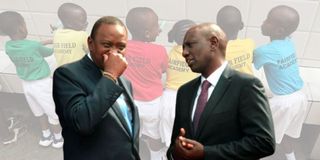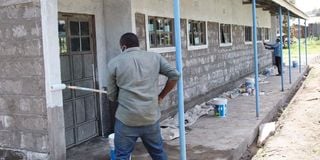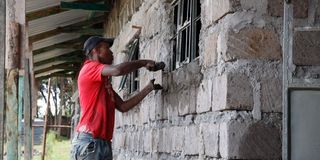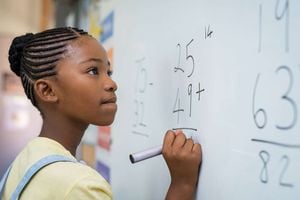
Former President Uhuru Kenyatta and his successor William Ruto.
On July 20, 2022, Kenya sought to extend the completion deadline for a World Bank-funded project intended to aid in the implementation of the Competency-Based Curriculum (CBC) to the financial year ended June 30, 2023.
The World Bank had approved a $200 million (Sh25.8 billion) loan. The government was to implement the project through the Ministry of Education, Teachers Service Commission and Kenya Institute of Curriculum Development.
Infrastructure development was just one component in the Sh25.8 billion Secondary Quality Improvement Project (SEQIP).
Nearly two financial years down the line, construction is incomplete and there is a standoff between Kenya and several contractors hired to build the infrastructure in 30 counties, with taxpayers now exposed to paying for past mistakes of public officials.
Despite the World Bank granting an extension of the deadline and allowing the reallocation of funds from some components of the project to different ones, it is still not complete, halfway into Kenya Kwanza’s first term.
The World Bank had in 2021 warned Kenya of the risk, but President Uhuru Kenyatta, Treasury Cabinet Secretary Ukur Yatani and his Education counterpart George Magoha did not heed the warning.
Now, President William Ruto’s administration has inherited the previous administration’s skunk, as eight firms claim in court that the Education ministry is blackmailing them into taking a haircut by maintaining the costs indicated in their bid papers of January, 2020.
The Sh25.8 billion World Bank loan was meant to build infrastructure, improve quality of teaching, retain learners after transition to secondary school, support the transition from 8-4-4 to CBC, and monitor and evaluate the entire project.
Now, the World Bank has kicked off an audit of the project, despite the fact that the infrastructure development component is not complete.

Workers paint a block of JSS classrooms at Elburgon Secondary School in Nakuru County in this photo taken on October 11, 2022.
The lender, on August 22, 2024, advertised a tender seeking a consultant to conduct an end term project evaluation for SEQIP. The tender closed on December 31, 2024. The bank labelled most aspects of implementing SEQIP as moderately satisfactory.
Eight firms obtained a court order on March 5 blocking the Education ministry from cancelling their contracts.
Eight firms
All Weather Investments Company Ltd, Columbia Developers, Samaha Company Ltd, Glenn Steam Engineering Works Ltd, Lantana Africa Ltd, Globetrek Systems (K) Ltd, Kinde Engineering Works Ltd and Pinnie Agency Ltd sought the orders barely 20 days after the World Bank audit tender closed.
The Education ministry did not respond to the application by the eight firms, leading Justice Josephine Wayua Mong’are to treat the assertions of the contractors as uncontested. This was after confirming that the court papers were properly served on the relevant government officials.
“Pursuant to the directions of this court, the respondents were served with the application herein but as at the time of writing this ruling, they had neither entered appearance nor filed a response to the application. I am therefore satisfied that the respondents herein were duly served and have had notice of the court documents herein,” Justice Mong’are said.
The World Bank disbursed the first tranche of cash on January 18, 2018 to get the project rolling. The Kenya Literature Bureau was among the first institutions to bag deals under the project as it won a Sh535.7 million tender to distribute science and mathematics textbooks for Class Seven, and teachers' guides under CBC.
Construction tenders were advertised in January 2020 as infrastructure development was allocated $82 million (Sh10.6 billion).
In December 2020, the ministry informed 25 companies that their bids were successful.
On January 21, 2021, the World Bank granted a first variation request from Kenya to reallocate $7.5 million (Sh970 million) from other components of the project, to infrastructure development, which had allegedly suffered a deficit.
Five days after the World Bank’s go-ahead, President Kenyatta issued a directive to the Treasury and Education ministries, halting the disbursement of funds under SEQIP. He further instructed Prof Magoha to do a needs analysis for each of the 30 regions targeted for infrastructure development.

Ongoing construction of Competency Based Curriculum classrooms at DEB Secondary School in Elburgon, Nakuru County, in late September last year.
World Bank Country Director Keith Hansen wrote to Mr Yatani on April 8, 2021 seeking answers on the delay in issuing successful bidders with contracts.
Mr Hansen warned that the delays risked leading to mis-procurement on account of the delays and requiring the whole process to start afresh. He also stressed the urgency in light of the Coronavirus pandemic.
“These activities (infrastructure development) have assumed even more importance in the current context of COVID-19 by providing an adequate number of classrooms to avoid overcrowding and adequate facilities to wash hands to avoid the spread of the disease in school settings and allow for the safe conduct of classes,” Mr Hanses said.
World Bank
Four successful bidders—Samaha Company Ltd, Columbia Developers, All Weather Investment Company and Lantana Africa—sued the Education ministry in September 2021 to have the contracts signed.
The following month, the Attorney-General’s office, on behalf of the Education ministry, objected to the case, arguing that Kenya had not received funds from the World Bank.
In June 2022 the firms eventually signed contracts and started construction in 25 counties.
A month later, Kenya sought a second variation of the project implementation—reduction of the infrastructure to be developed so as to remain within the Sh25.8 billion budget.
“Due to constraints in project funds, the envisaged scope for school infrastructure at project design was substantially reduced and the list of target sub-counties for the school infrastructure was updated to reflect changes in administration boundaries,” a World Bank paper reads.
In the same month, tenders were re-advertised for the construction of classrooms, laboratories and sanitation facilities in the remaining five counties.
Water and sanitation infrastructure in primary schools was reduced to 1,872 structures from 3,000. Classrooms and laboratories to be built were cut down to 1,821 from the initial 2,000.
This was despite the World Bank’s advice on avoiding overcrowding in schools. But the blunder had already been made, and there was no other way to complete the project within the approved loan amount.
By this time, the cost of materials had shot up on account of economic shutdowns globally because of the Covid-19 pandemic, and the Russia-Ukraine war.
The firms that sued the government have mentioned in their court papers that the rise in cost of materials post-Covid and effects of the Russia-Ukraine war—both of which happened during the standoff over award of contracts—saw prices rise by the time they hit the ground.
Towards the end of 2024, that pressure started to pile afresh. On January 20 this year, the firms filed their application before Justice Mong’are.
Retention of learners under SEQIP also included scholarships for children from poor families and the provision of sanitary towels for teenage girls.
In the July 2022 variation request, Kenya said the Covid-19 pandemic’s effects required her to pump more money into keeping children in school.
The number of Grade seven and eight learners to benefit from in-kind support and mentorship was increased to 1.1 million, from the initial 37,500.










